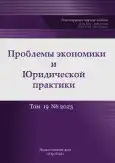Migration Monitoring According to the Ministry of Internal Affairs: Problems, Current Status and Prospects
- Authors: Smirnova N.V.1
-
Affiliations:
- Financial University under the Government of the Russian Federation
- Issue: Vol 19, No 6 (2023)
- Pages: 192-201
- Section: Regional and Sectoral Economics
- URL: https://journal-vniispk.ru/2541-8025/article/view/252478
- EDN: https://elibrary.ru/SBGPUO
- ID: 252478
Cite item
Abstract
The article is devoted to one of the most pressing problems of the modern world—international migration. The scale and nature of immigration to the Russian Federation are considered. International migration, largely labor migration, has now become an integral economic feature for any State. In terms of population displacement, modern Russia is highly integrated into the global economy and is currently the fourth destination country in the world, second only to the United States of America, Germany and Saudi Arabia. Considering the migration situation in the country, the main migration donors for the Russian Federation, which are citizens of the CIS and the EAEU, are noted. The main share of those entering the territory of the country is defined as «work» for their purpose of stay. Researchers consider demographic factors to be destabilizing factors of the labor market, which are manifested in the trend of natural population decline that has developed in recent years. In this case, population migration acts as a means of redistributing human capital. This process causes positive changes in the economy, in intercultural exchange, but illegal migration can have a negative impact, lead to an increase in crime and, on the contrary, negatively affect the country's economy, reduce the sustainability of regional development. The article focuses on identifying the risks of illegal migrant labor. The information base of the study was statistical and analytical materials of the international statistics services and the database of the Ministry of Internal Affairs of the Russian Federation.
Full Text
##article.viewOnOriginalSite##About the authors
Nelly V. Smirnova
Financial University under the Government of the Russian Federation
Author for correspondence.
Email: nellik@inbox.ru
SPIN-code: 2946-4890
Scopus Author ID: 1080857
Cand. Sci. (Econ.), Senior Researcher
Russian Federation, MoscowReferences
- Akyulov R.I. Shadow economy and illegal migration: problems and prospects of regulation // Discussion. 2020. № 6 (103). pp. 52–58.
- Vishnevsky A.G., Denisenko M.B., Zayonchkovskaya J.A., Mkrtchyan N.V. Demographic challenges of Russia. Part Three—migration// Demoscope Weekly. 2017.№ 753-754. pp. 1–10
- Voronov A.S., Glazyev S.Yu., Orlova L.N., Kudina M.V. Forecast of human capital development in the Russian Federation in the context of changes in the world economy // Public administration. Electronic bulletin. 2022. № 91. pp. 24–44.
- Grigoryan G.R., Kevorkova J.A., Toganyan A.S. Investigation of the impact of remittances and migration processes on the economy and economic security of donor and recipient countries of migration // Modern economics: problems and solutions. 2021. Vol. 8. pp. 47–59.
- Zabelina O. V. New employment trends in the informal sector as challenges to the policy of formalization of the Russian labor market / O. V. Zabelina, F. I. Mirzabalaeva // Labor economics. 2023. Vol. 10, № 2. pp. 263–278.
- Karimova A. A. Migration of the population: the essence and statistical indicators // Economics and entrepreneurship. 2019. № 11. pp. 231–234.
- Kartseva, M. A. Migration in Russia and socio-economic development of regions: analysis of mutual influence / M. A. Kartseva, N. V. Mkrtchyan, Yu. F. Florinskaya // Problems of forecasting. 2020. № 4(181). pp. 87–97.
- Krasinets E.S. International labor migration in the development of modern Russia // Population. 2022. Vol. 25. № 2. pp. 104–115.
- Kuznetsova I.A., Kuznetsova N.A., Matveeva T.P. The practice of combating the illegal labor market: a national and international legal aspect // Humanities, socio-economic and social sciences. 2022. № 10. pp. 173–176.
- Kulaeva N., Muzychenko E., Pavlyushina V. International money transfers of migrants are the most important source of financing for developing countries // Bulletin on current trends in the Russian economy. 2019. №48. 16 p.
- Mkrtchyan N.V., Florinskaya Yu.F. Labor migration in Russia: international and domestic aspects // Journal of the New Economic Association. 2018. Vol. 1. № 37. p. 186.
- Petrova O.V. Illegal migration processes as a threat to Russia's economic security. Diss. for the degree of Candidate of Economic Sciences. St. Petersburg, 2020. 180 p.
- Rostovskaya T. K., Ryazantsev S.V. [et al.] Demographic well-being of Russia. National demographic report /ed. by S. V. Ryazantsev; FNISTC RAS. M.: Etc. «Perspective». 2022. 108 p.
- Smirnov V.M., Orlova L.N., Safin R.A. Problems of measuring and accounting for illegal migration in Russia and in the world // RISK: Resources, Information, Supply, Competition. 2023. № 3. pp. 129–136.
- Toganyan A.S. Theoretical and methodological aspects of migration processes in the context of economic security of the Russian Federation // International trade and trade policy. 2022. Vol. 8. № 3 (31) pp. 120–129.
- Urda M. N. Risk management of migration crime in a pandemic //Bulletin of the Volgograd Academy of the Ministry of Internal Affairs of Russia. 2020. № 3 (54). pp. 62–70.
- Shlapak M.A. Illegal labor migration and its impact on the national security of the Russian Federation // International Journal of Constitutional and State Law. 2019. № 2. pp. 81–84.
Supplementary files










